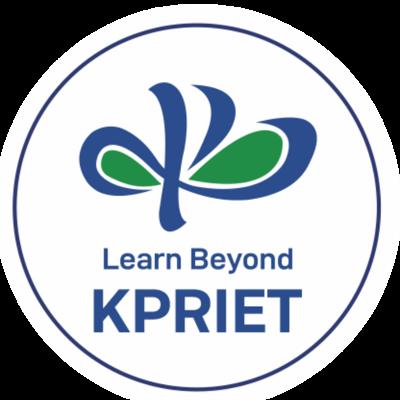The need for AI talent pool is predicted to surge in India as a result of the government's move toward digitization and many organisations speeding their digital transformation activities.
The Department of Computer Science and Engineering (Artificial Intelligence and Machine Learning) at KPR Institute of Engineering and Technology is committed to delivering excellence in education and research, equipping students with core knowledge in Computer Science and cutting-edge knowledge in Artificial Intelligence and Machine Learning.
Established to meet the growing demand for skilled professionals in emerging technologies, the department offers a robust curriculum blending core computing fundamentals like Programming, Data Structures and Algorithms, Computer Architecture, Database Management Systems, Computer Networks, Web Development, Mobile App Development and advanced AIML concepts like Artificial Intelligence, Machine Learning, Deep Learning, Natural Language Processing, Computer Vision, and Generative AI.
With a strong emphasis on experiential learning, students engage in hands-on projects, industry collaborations, and state-of-the-art lab work to enhance problem-solving skills and innovation. Our experienced faculty foster a research-oriented environment, enabling students to explore in various domains.
The department aims to develop ethical and skilled professionals who can effectively use AI to solve real-world problems and drive global digital transformation.
To establish as a technology hub of education, research and solution in artificial intelligence and machine learning.
PEO 1: Devise cutting edge solutions to the emerging technological problem.
PEO 2: Practice lifelong learning by upskilling in advanced research in artificial intelligence and machine learning technologies.
PEO 3: Function in their profession as socially responsible individuals adhering to the rich cultural and moral ethics.
PO 1. Engineering knowledge: Apply the knowledge of mathematics, science, engineering fundamentals, and an engineering specialization to the solution of complex engineering problems
PO 2. Problem analysis: Identify, formulate, review research literature, and analyze complex engineering problems reaching substantiated conclusions using first principles of mathematics, natural sciences, and engineering sciences
PO 3. Design/development of solutions: Design solutions for complex engineering problems and design system components or processes that meet the specified needs with appropriate consideration for the public health and safety, and the cultural, societal, and environmental considerations
PO 4. Conduct investigations of complex problems: Use research-based knowledge and research methodsincluding design of experiments, analysis and interpretation of data, and synthesis of the information to provide valid conclusions
PO 5. Modern tool usage: Create, select, and apply appropriate techniques, resources, and modern engineering and IT tools including prediction and modeling to complex engineering activities with an understanding of the limitations
PO 6. The engineer and society: Apply reasoning informed by the contextual knowledge to assess societal, health, safety, legal and cultural issues and the consequent responsibilities relevant to the professional engineering practice
PO 7. Environment and sustainability: Understand the impact of the professional engineering solutions in societal and environmental contexts, and demonstrate the knowledge of, and need for sustainable development
PO 8. Ethics: Apply ethical principles and commit to professional ethics and responsibilities and norms of the engineering practice
PO 9. Individual and team work: Function effectively as an individual, and as a member or leader in diverse teams, and in multidisciplinary settings
PO 10. Communication: Communicate effectively on complex engineering activities with the engineering community and with society at large, such as, being able to comprehend and write effective reports and design documentation, make effective presentations, and give and receive clear instructions
PO 11. Project management and finance: Demonstrate knowledge and understanding of the engineering and management principles and apply these to one's own work, as a member and leader in a team, to manage projects and in multidisciplinary environments
PO 12. Life-long learning: Recognize the need for, and have the preparation and ability to engage in independent and life-long learning in the broadest context of technological change
PSO 1: Design and develop an intelligent automated system applying fundamental knowledge from mathematical, analytical programming and operational skills to solve the arising problems in the field of technology.
PSO 2: Efficiently apply machine learning techniques to fit various business situations.
Duration: 4 years (Regular) / 3 Years (Lateral Entry)
No. of Semesters: 8 (Regular) / 6 (Lateral Entry)
Intake / No. of Seats: 60


The Department of Computer Science and Engineering (Artificial Intelligence and Machine Learning) at KPRIET prepares students for a thriving career in the rapidly evolving technology landscape. With a curriculum designed to meet the needs of the AI-driven world, students are equipped with cutting-edge skills, making them highly sought-after in diverse industries.
Graduates from the Intelligent Systems Lab are proficient in designing and deploying AI solutions, making them industry-ready professionals and innovative researchers.
When it comes to high-performance in the field of Machine Learning and Big Data analysis, the iMac High-end Machines have emerged as a clear leaders in recent years. iMac has long been a popular platform for Data Scientist.
Data scientists combine technology and social science both together to detect trends and manage data using Macs powered by all-new M1 CPUs and the Pattern Recognition computed framework available in macOS Big Sur and Monterey.
Any workload can be easily handled by a super-fast processor and graphics, enormous memory, and all-flash storage.

Artificial Intelligence Laboratory
Powered by Apple Inc.

Machine Learning Laboratory
Powered by Apple Inc.
| 1 | Display | 68.58 cm / 27-inch (diagonal) 5K Retina display |
|---|---|---|
| 2 | Processor | Configurable to 3.8GHz 10-core 10th-generation Intel Core i9, Turbo Boost up to 5.0GHz |
| 3 | Memory | Configurable to 16GB, 32GB, 64GB or 128GB |
| 4 | Storage | Configurable to 1TB, 2TB, 4TB or 8TB SSD |
| 5 | Graphics | Configurable to AMD Radeon Pro 5700 XT with 16GB of GDDR6 memory |
| 6 | Video Support and Camera | 1080p FaceTime HD camera |
| 7 | Input | Magic Keyboard and Magic mouse |
| 8 | Operating System | macOS Monterey |





